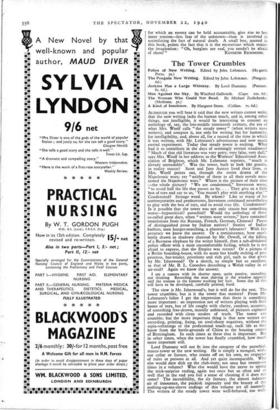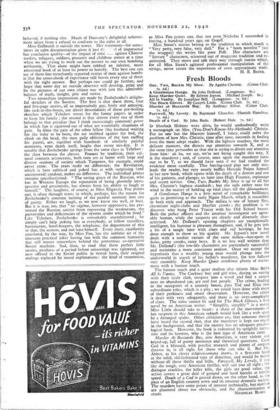The Tower Crumbles
A Kind of Insolence. By Margaret Steen. (Collins. 75. 6d.) ALTHOUGH you will hear it said that the new writers cannot write, that the new writing lacks the human touch, and is, among other
things, not intelligible, it would be interesting to concoct an
anthology of, say, the late-middle nineteenth century, the era of what Mrs. Woolf calls "the steady tower" (when writers were writers), and compare it, not only for writing but for humanity, for intelligibility, and, above all, for a record of the time in which it was written, with Mr. Lehrnann's adventurous and now much envied experiment. Today that steady tower is rocking. What had it to contribute in the days of seemingly eternal steadiness? "Much of that old literature was very petty, very false; very dull," says Mrs. Woolf in her address to the Workers' Educational Asso- ciation of Brighton, which Mr. Lehmann reprints, "much is already unreadable". Was the tower, built to look like granite, in reality stucco? Scott and Jane Austen lived their lives, as Mrs. Woolf points out, through the entire drama of the Napoleonic wars; yet "neither of them in all their novels men- tioned the Napoleonic wars." Where is the picture of their time —the whole picture? "We are condemned," Stevenson wrote, "to avoid half the life that passes us by. . . . They give us a little box of toys and say to us, 'You mustn't play with anything else.'" Condemned? Strange word. By whom? Like so many of his contemporaries and predecessors, Stevenson continued nevertheless to play with the box of toys, and to avoid true life. Condemned? Is it possible that the tower was not only stucco but something worse—hypocritical? parochial? Would the anthology of those so-called great days, when "writers were writers," have contained translations from the Russian, French, German, Chinese? Pieces of distinguished prose by Indian natives? Stories of Indian barbers, men hunger-marching, a plasterer's labourer? With fair accuracy we know the answer. Or a reminiscence, here excel- lently drawn in shadowy charcoal by Mr. Orwell, of the killing of a Burmese elephant by the writer himself, then a sub-divisional police officer with a most uncomfortable feeling, which he is not afraid to express, that the Empire was rotten? Or a picture of a Berlin boarding-house, with its acute but kindly etching of pro- prietress, bar-tender, prostitute and rich girl, such as that given by Mr. Isherwood? Or a sketch, so simple but so excellent, as that of Mr. B. L. Coombes describing a Welsh valley in an air-raid? Again we know the answer.
I am a camera with its shutter open, quite passive, recording. not thinking. Recording the man shaving at the window opposite and the woman in the kimono washing her hair. Some day all this will have to be developed, carefully printed, fixed.
The view is Mr. Isherwood's; but it will do for the rest. The tower crumbles; but is it the tower that matters? From Mr. Lehmann's folios I get the impression that there is something more important: an impression not of writers playing with little boxes of toys, but of life caught with clarity, candour, accuracy, of something free-drawn, morally unbiassed, of pictures captured and recorded with clean strokes of truth. The tower can crumble; but the more important thing is that new writers are recording, printing, fixing, on steel-sharp negatives, without the sepia-softenings or the professional touch-up, such life as they know from the battle-grounds of China to the housing estates of Birmingham. In such times as these that is important. But in other times, when the tower has finally crumbled, how much more important still.
Lord Dtmsany will not fit into the category of the parochial, stucco tower or the new writing. He is simply a mongrel, with- out collar or licence, who roams off on his own, no respecter of rules or persons at all. And yet quite incomparable. Who else would dare dish up the club-story, not once but twenty-six times in a volume? Who else would have the nerve to spring
the trick-surprise ending, again not once but so often and so well that in the end you feel a sense of cheating if it does not come? The incredibility, the sly fantasy, the almost indecent
air of innocence, the puckish ingenuity and the beauty of the nothing-up-my-sleeve endings of this volume are all masterly. The writers of the steady tower were well-behaved, too well behaved, if nothing else. Much of Dunsany's delightful achieve- ment arises from a refusal to conform to. the rules at all.
Miss Galbraith is outside the tower. Her statement—for some- times its calm documentation gives it just th: :d of impersonal but conclusive quality—of the impact of total against Chinese coolies, refugees, soldiers, peasants and children comes at a time when we are trying to work out the answer to our own bombing arithmetic. That alone might have robbed an inferior, more emotional book of at least its power to horrify. The best one can say of these fine trenchantly reported stories of men against bombs is that the cross-check of experience still leaves every one of them with the right answer. But perhaps one could go further, and hope that some day an outside observer will develop, print and fix the pictures of our own citizen war with just this admirable balance of truth, insight, pity and terror.
Two immediate impressions are made by Zoshchenko's delight- ful sketches of the Soviets. The first is that these three, four and five-page stories, all so impressively gay, lively and amusing, like jack-in-the-boxes, are direct descendants of those pot-boiling sketches which Tchehov wrote for the funny papers in order to keep his family ; the second is that almost every one of them belongs to that peculiar (but I think increasingly common) genre in which fun is squeezed out of what are essentially situations of pain. In films the pain of the other fellow (the husband waiting for the baby to be born, the toe stubbed against the bed, the clonk on the head, the man gaily oblivious of the lion sniffing his pants), are, together with hundreds of similarly painful moments, even death itself, laughs that never mis-fire. It is notable that Zoshchenko springs from the same class as Tchehov : the class between the classes. Peasant by tradition, their cul- tural contacts aristocratic, both men are at home with large and diverse sections of society which Turgenev, for example, could never enter. The years make no difference; the Revolution, which is here satiriszci and poked fun at with surprising (and uncensored) candour, makes no difference. The individual genius remains uncollectivised. "The saving grace of the Russian, who has in Western Europe the reputation of being gloomily intro- spective and pessimistic, has always been his ability to laugh at himself." The laughter, of course, as Miss Eligaveta Fen points out, is often through tears; in which, perhaps, lies the reason for Zoshchenko's constant turning of the painful moment into one of gaiety. Either we laugh, as we now know too well, or bust. But it is true, too, that "no regime, however oppressive, has pre- vented the Russian satirist from expressing the weaknesses, the perversities and deficiencies of the system under which he lived." Like Tchehov, Zoshchenko is remarkably unembittered ; he simply can't help poking fun at everybody, at fellow travellers, bureaucrats, hotel-keepers, the telephone, the department of this or that, the system, and not least himself. Every story, excellently translated, by the way, by Miss Fen, has the sublime air of the innocent practical joker having fun with the common humanity that still moves somewhere behind the portentous co-operative Soviet machine. Sad, then, to read that these perfect little stories, products of a period before censorship was tightened, are now offered to the Soviet public in vetted form, their original endings replaced by moral explanations : the kind of recantation, as Miss Fen points out, that not even Nicholas I succeeded in forcing, a hundred years ago, on GogoI.
Miss Steen's stories belong to the tradition in which much is "Very petty, very false, very dull." For a "born novelist" (see the wrapper) she writes like poor Poll. Her characters are " literary " characters, scissored out of magazine tradition and re- animated. They move and talk their way through stories which, for all Miss Steen's agitated professional manipulation of the strings, never create the impression of even approximate truth.
H. E. BATES.



























































 Previous page
Previous page